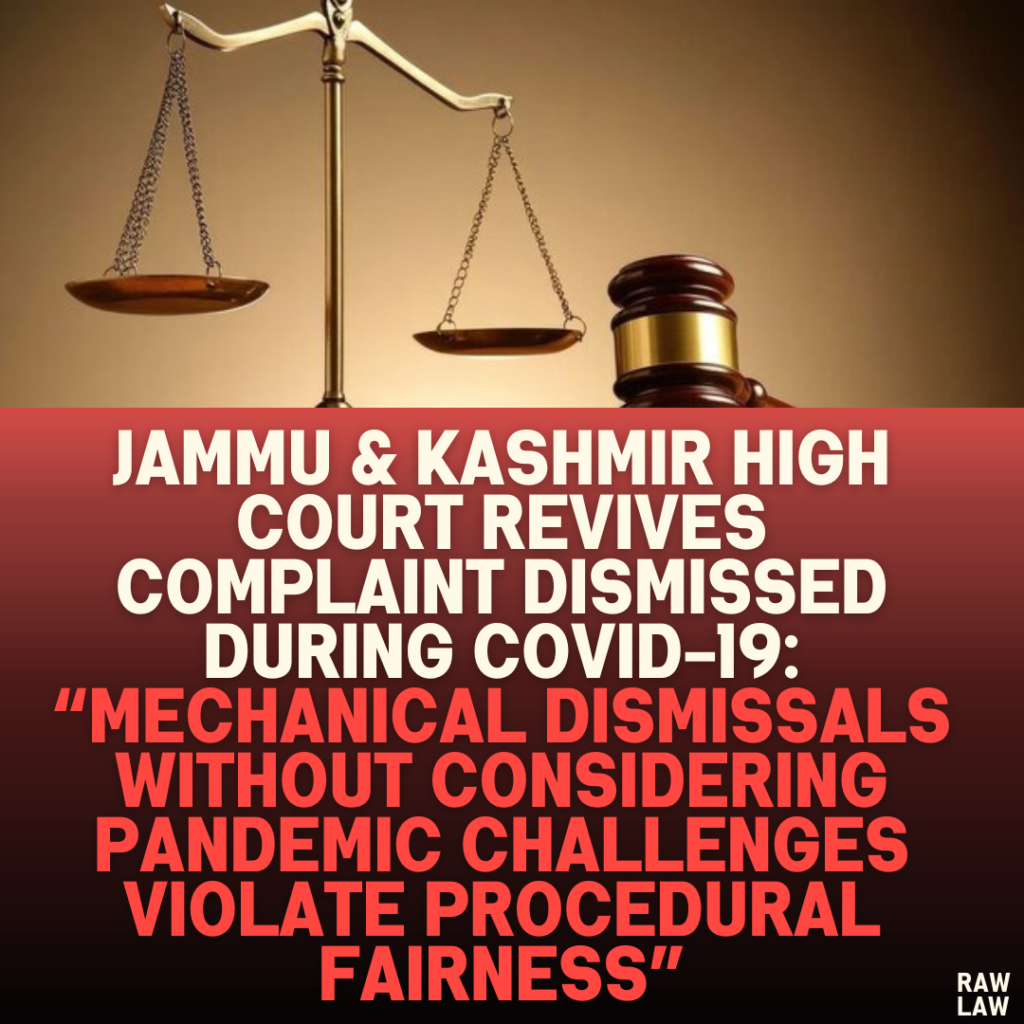Court’s Decision:
The Jammu & Kashmir High Court set aside the dismissal order of a complaint under Section 138 of the Negotiable Instruments Act, 1881, passed by the Judicial Magistrate 1st Class (Munsiff), Akhnoor. The Court held that the dismissal, which occurred due to non-prosecution during COVID-19 restrictions, reflected judicial oversight and procedural unfairness. The complaint was revived, and proceedings were ordered to resume from the stage last effectively conducted, ensuring that the respondent is duly served and present for further hearings.
Facts:
- Initiation of the Complaint:
The appellant filed a criminal complaint against the respondent under Section 138 of the NI Act for dishonor of two cheques issued by the respondent. The cheques were as follows:- Cheque No. 070018 dated 24.05.2017 for ₹7,00,000.
- Cheque No. 070019 dated 29.06.2017 for ₹2,00,000.
- Notice to the Respondent:
The respondent was served notice and began appearing in the proceedings from 15.01.2020. - COVID-19 Disruption:
Due to the COVID-19 pandemic, public life, including court proceedings, was disrupted. Restrictions on court access limited the ability of litigants to attend hearings, leaving representation largely in the hands of advocates. - Dismissal of Complaint:
The Judicial Magistrate 1st Class (Munsiff), Akhnoor, dismissed the complaint on 09.03.2022 for non-prosecution. The last effective hearing had been on 29.01.2022, during which the court recorded the existence of COVID-19 restrictions. - Appeal Against Dismissal:
The appellant argued that the dismissal was mechanical and failed to account for the extraordinary circumstances posed by the pandemic, thereby denying him a fair opportunity to prosecute his case.
Issues:
- Was the Judicial Magistrate justified in dismissing the complaint during the pandemic without sufficient safeguards for procedural fairness?
- Did the dismissal result in prejudice against the appellant, contrary to established legal principles?
Petitioner’s Arguments:
- The appellant contended that the dismissal order was passed without considering the challenges posed by the COVID-19 pandemic, such as restrictions on movement and court access.
- It was argued that the Magistrate failed to issue a notice to the appellant, depriving him of an opportunity to appear in court and continue the proceedings.
- The appellant highlighted that the dismissal reflected a mechanical approach, disregarding the principles of justice and fairness.
Respondent’s Arguments:
The respondent, despite being served with notice, did not appear before the High Court or file any response in the appeal.
Analysis of the Law:
- Procedural Fairness:
The Court reiterated the well-established legal principle that judicial actions should not prejudice any party. Procedural fairness demands that courts act diligently to ensure that litigants are not unfairly disadvantaged, especially during extraordinary circumstances like a global pandemic. - Impact of COVID-19 on Justice Delivery:
The pandemic introduced unique challenges to the justice delivery system, necessitating a more indulgent approach by courts to avoid miscarriage of justice. Courts were expected to adapt and provide adequate safeguards to protect litigants’ rights during this period. - Duty of the Judiciary:
The Court emphasized that a judicial act should not result in unfair prejudice to any party, as it would undermine the very purpose of justice. The Magistrate’s failure to issue a notice to the appellant, despite knowing the challenges posed by the pandemic, amounted to a failure in upholding this duty.
Precedent Analysis:
While the Court did not cite specific precedents, the judgment reinforces a general principle in Indian jurisprudence: judicial processes must ensure that litigants are afforded a fair opportunity to present their case, and procedural technicalities should not result in unjust outcomes.
Court’s Reasoning:
- Mechanical Dismissal:
The Court observed that the Judicial Magistrate acted mechanically by dismissing the complaint without considering the prevailing COVID-19 restrictions. The dismissal reflected a lack of due diligence and resulted in a miscarriage of justice. - Failure to Issue Notice:
The Court noted that the Magistrate should have issued a notice to the appellant, informing him of the need for his personal appearance or the risk of dismissal. This procedural safeguard would have ensured fairness and protected the appellant’s right to prosecute his case. - Prejudice to the Appellant:
The Court emphasized that the dismissal order unfairly prejudiced the appellant by denying him an opportunity to have his complaint adjudicated on merits. This was contrary to the principle that judicial acts should not harm any party.
Conclusion:
The High Court allowed the appeal, set aside the dismissal order, and revived the complaint. The Judicial Magistrate was directed to resume proceedings from the stage last effectively conducted. The Court also instructed the Magistrate to ensure proper service of notice to the respondent before proceeding further. The appellant was directed to appear before the Magistrate on 16.12.2024.
Implications:
- Fairness in Judicial Processes:
The judgment reinforces the judiciary’s responsibility to adapt procedural norms during extraordinary circumstances to prevent miscarriage of justice. - Safeguards During Crises:
It highlights the need for courts to implement additional safeguards, such as issuing notices, to ensure fairness during periods of disruption. - Revival of Cases:
The decision sets a precedent for reviving cases dismissed mechanically due to procedural lapses during the pandemic, ensuring that justice is not denied due to technicalities.




Pingback: Delhi High Court Dismisses Premature Family Pension Claim: Affirms No Cause of Action Exists During Government Servant's Lifetime and Condemns Litigation as Harassment - Raw Law
Pingback: Delhi High Court Grants Conditional Bail in ₹524 Crore Corporate Fraud Case: Emphasizes Revival Efforts Over Prolonged Incarceration to Protect Investor Interests - Raw Law